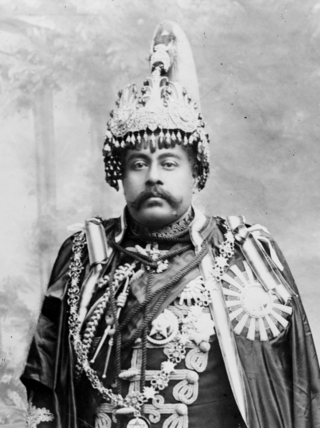Juddha Shumsher Jung Bahadur Rana
Former prime minister of Nepal From Wikipedia, the free encyclopedia
Field Marshal Shri Shri Shri Maharaja Sir Juddha Shumsher Jung Bahadur Rana (Nepali: जुद्ध शम्शेर जङ्गबहादुर राणा) GCB GCSI GCIE (19 April 1875 in Narayanhity Palace, Kathmandu – 20 November 1952 in Dehradun, India)[citation needed] was the Prime Minister of Nepal from 1 September 1932 to 29 November 1945 as the head of the Rana dynasty.
Juddha Shumsher Jung Bahadur | |
|---|---|
| श्री ३ जुद्ध शम्शेर जङ्गबहादुर राणा | |
 | |
| 15th Prime Minister of Nepal | |
| In office 1 September 1932 – 29 November 1945 | |
| Monarch | King Tribhuvan |
| Preceded by | Bhim Shumsher |
| Succeeded by | Padma Shumsher |
| Personal details | |
| Born | 19 April 1875 Narayanhity Palace, Kathmandu |
| Died | 20 November 1952 (aged 77) Dehradun, India |
| Parent(s) | Dhir Shumsher Jung Bahadur Rana (father) Juhar Kumari Devi (mother) |
He was the Field marshal and Maharaja of Lamjung and Kaski.[1] He is credited for rebuilding the Dharahara which was destroyed by the 1934 Nepal–Bihar earthquake.
Early life
Juddha Shumsher Jung Bahadur Rana was born on 19 April 1875 at the Narayanhiti Palace in Durbar Marg, Kathmandu to Dhir Shumsher Rana and Juhar Kumari Devi.[2] Rana was born into a noble Hindu Chhetri family, his father Dhir Shamsher, was the youngest brother of Jung Bahadur Rana who started the Rana dynasty, and his mother belonged to a noble Rajput family from Kangra.[2] He was made colonel by Jung Bahadur during his Annaprashana ceremony which marks an infant's first intake of food other than milk.[3] At the age of nine, his father Dhir Shumsher died, subsequently, he was looked after by his brothers.[3] Following the 1885 Nepal coup d'état, his elder brother Bir Shumsher became the prime minister and Juddha was made a general and given an allowance of 21,000 Nepalese rupees (NPR).[3] At the age of 12, he was enrolled in a school, however, due to his deteriorating health, Rana had to leave his studies.[3] During that time, he lived with Bhim Shumsher, who also performed his Upanayana ceremony.[3] In 1888, he was married to Padma Kumari Devi of Gulmi.[4]
Ancestors
| Ancestors of Juddha Shumsher Jung Bahadur Rana | |||||||||||||||||||||||||||||||||||||||||||||||||||||||||||||||||||||||||||||||||||||||||||||||||||||||||||||||||||||||||||||||||||||||||||||||||||||||||||||||||||||||||||||||||||||||||||||||||||||||||||||||||||||||||||||||||||||||||||||||||||||||||||||||||||||||||||||||||||||||||||||||||||||||||||||||||||||||||||||||||||||||||||||||||||||||||||||||||||||||||||||||||||||||||||||||||||||||||||||||||||||||||||||||||||||||||||||||||||||||||||||||||||||||||||||||||||
|---|---|---|---|---|---|---|---|---|---|---|---|---|---|---|---|---|---|---|---|---|---|---|---|---|---|---|---|---|---|---|---|---|---|---|---|---|---|---|---|---|---|---|---|---|---|---|---|---|---|---|---|---|---|---|---|---|---|---|---|---|---|---|---|---|---|---|---|---|---|---|---|---|---|---|---|---|---|---|---|---|---|---|---|---|---|---|---|---|---|---|---|---|---|---|---|---|---|---|---|---|---|---|---|---|---|---|---|---|---|---|---|---|---|---|---|---|---|---|---|---|---|---|---|---|---|---|---|---|---|---|---|---|---|---|---|---|---|---|---|---|---|---|---|---|---|---|---|---|---|---|---|---|---|---|---|---|---|---|---|---|---|---|---|---|---|---|---|---|---|---|---|---|---|---|---|---|---|---|---|---|---|---|---|---|---|---|---|---|---|---|---|---|---|---|---|---|---|---|---|---|---|---|---|---|---|---|---|---|---|---|---|---|---|---|---|---|---|---|---|---|---|---|---|---|---|---|---|---|---|---|---|---|---|---|---|---|---|---|---|---|---|---|---|---|---|---|---|---|---|---|---|---|---|---|---|---|---|---|---|---|---|---|---|---|---|---|---|---|---|---|---|---|---|---|---|---|---|---|---|---|---|---|---|---|---|---|---|---|---|---|---|---|---|---|---|---|---|---|---|---|---|---|---|---|---|---|---|---|---|---|---|---|---|---|---|---|---|---|---|---|---|---|---|---|---|---|---|---|---|---|---|---|---|---|---|---|---|---|---|---|---|---|---|---|---|---|---|---|---|---|---|---|---|---|---|---|---|---|---|---|---|---|---|---|---|---|---|---|---|---|---|---|---|---|---|---|---|---|---|---|---|---|---|---|---|---|---|---|---|---|---|---|---|---|---|---|---|---|---|---|---|---|---|---|---|---|---|---|---|---|---|---|---|---|---|---|---|---|---|---|---|---|---|---|---|---|---|---|---|---|---|---|---|---|---|---|---|---|---|---|---|---|---|---|---|---|---|---|---|---|---|---|---|---|---|---|---|---|---|---|---|---|---|---|---|---|---|
| |||||||||||||||||||||||||||||||||||||||||||||||||||||||||||||||||||||||||||||||||||||||||||||||||||||||||||||||||||||||||||||||||||||||||||||||||||||||||||||||||||||||||||||||||||||||||||||||||||||||||||||||||||||||||||||||||||||||||||||||||||||||||||||||||||||||||||||||||||||||||||||||||||||||||||||||||||||||||||||||||||||||||||||||||||||||||||||||||||||||||||||||||||||||||||||||||||||||||||||||||||||||||||||||||||||||||||||||||||||||||||||||||||||||||||||||||||
See also
References
Wikiwand - on
Seamless Wikipedia browsing. On steroids.
